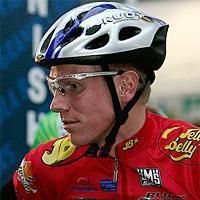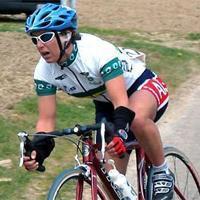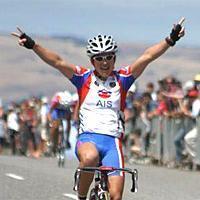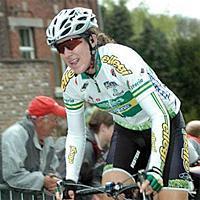Latest Cycling News for July 29, 2004Edited by Chris Henry Bergman sacked by Jelly Belly, may lose NRC pointsBy Gerard Knapp
Minnesota-based cyclist Adam Bergman has been sacked by the Jelly Belly presented by Aramark cycling team and made to return his equipment, following the announcement by the US Anti-Doping Authority (USADA) that he had tested positive for recombinant human Erythropoietin (rEPO). Bergman has accepted the provisional suspension, according to USADA, and on July 27, 2004, he commenced serving what could be a two-year suspension from the sport. However, the final penalty will be decided at a hearing to be held later this year. A spokesperson for USA Cycling said it's likely the rider will request a hearing and until a decision is made by the Court of Arbitration for Sport (CAS), he is not suspended by the USAC. However, by accepting the provisional suspension, Bergman has agreed not to compete in any competitions under the jurisdiction of UCI, USAC or the United States Olympic Committee. The USAC spokesperson said that if proven guilty at the hearing, it's also likely that Bergman will be stripped of the points he has accumulated throughout the 2004 race season. Currently, Bergman is in second place on the US Cycling Federation National Racing Calendar (USCF NRC), the all-important domestic race series in the USA. The 23 year-old Bergman is on 937 points, trailing Webcor's Chris Horner who's in first place with 1300 points according to the latest data from the USAC. Further, Bergman's team, Jelly Belly presented by Aramark, is second in the NRC teams classification. The USAC spokesperson said that although there is no written policy on suspended riders automatically losing their NRC points, a precedent had been set in the cases of T-Mobile rider Amber Neben and Monex's Roberto Gaggioli, as both riders were stripped of their NRC points following their suspensions. April test prior to GeorgiaThe out-of-competition doping test that returned the positive result was conducted by USADA on April 6 this year. Some two weeks later, Bergman entered the high-profile stage race, the Tour de Georgia, and was Jelly Belly's highest-placed rider at the end of the seven-stage, six-day road race through the southern US state. Bergman finished in 11th place on GC in the challenging event that featured several division 1, European-based teams. One of the more popular doping agents, rEPO is a synthetic hormone that stimulates the body's production of red blood cells thereby increasing oxygen transport and aerobic power. According to sports science tests, the performance-enhancing benefits of EPO can last for up to six weeks after the drug has been administered. However, the commonly-used urine test for EPO can only detect the drug within three days of it being used. But at the Tour de France this year, the much-vaunted "off" test was finally introduced after first being proposed for the Sydney 2000 Olympics. In Liège earlier this month, the UCI presented the first ever blood testing regimen that can be used as an anti-doping test. There are two components: ON and HR-OFF, where H stands for hemoglobin and R stands for reticulocytes (immature red blood cells). The ON test can detect the use of EPO (or similar blood boosting drug) up to five days after the last injection. It is thus only marginally more effective than the current urine test. The more interesting method is HR-OFF, which can detect blood manipulations for up to four weeks using a technique based on measuring the quantities of hemoglobin and reticulocytes in the blood. If this falls outside a certain limit, then a rider will be declared unfit to race and a disciplinary procedure will be opened against them. (See full report). Click here for the full Bergman story. Aussie women ready for AthensBy Kristy Scrymgeour
With only 18 days remaining before the Olympic road events, the Australian women's team of Oenone Wood, Olivia Gollan and Sara Carrigan is fired up and ready to go and it has been decided that Wood will get the ride in the time trial due to her consistent results this season. In what was almost a controversy, Wood has finally been told that the time trial spot is hers despite Sara Carrigan having the most points at the time the team was selected. Carrigan earned her spot in the Olympic team by means of a points system that consisted of results in time trial events over the last year. Carrigan just beat out Hemsley for the third Olympic position and will ride the road race, but a clause in the selection criteria has allowed Wood to take the only time trial spot. "Sara qualified with the most points," explained Wood, "but everybody had to do three time trials and it was the best of three. Unfortunately I only got to race two time trials because Coppa della Nazione was cancelled. Lucky for me there was a clause in the selection criteria that enabled the selectors to choose who rode in cases such as this." As Australian time trial champion, Wood is happy with the decision and says she will ride unless she is injured or ill. "Already as it is, it was an emotional time," she explained," because nobody could give me an answer as to whether I was riding the TT or not. It wasn't officially announced until earlier this month."
Carrigan, who has just finished an intensive training camp at altitude in the mountain town of Livigno, Italy accepts the decision, although is a little disappointed. "If the strongest time trialer races on the day, I'll be happy. If I'm not going my best and am not capable of a medal, then I'm happy for someone else to ride, otherwise, I'll be very, very disappointed. Carrigan adds that she is feeling "fantastic. I'm really happy with my preparation. I've been able to specifically target those areas in which I have been lacking this year." Wood and Gollan chose racing over altitude training for their preparation for the Olympics and have just completed Thuringen Rundfahrt in Germany. "Thuringen was an awesome tour," said Wood, "and great preparation for the Olympics. The terrain is quite tough and good for strength training. Everyone there was on a mission to prepare for the Olympics so it was good racing." Gollan added that the racing their helped with their confidence before the Games. "I felt good this week," she said, "and it's given me a little it of confidence. But there were some really fit girls there and we are really going to have to work together. I think that is our strength. We've had the unique opportunity in that we've been raving together all year. Oenone and I have been racing together for two years now and we just know what each other can do."
Wood was also happy with the way things panned out at Thuringen. "We were pretty competitive in Thuringen," she explained. "Olivia was sitting in second position and I was in fourth and we were working for Olivia in the GC. Unfortunately we missed the break [in stage five], but our results in the time trial were good so we're definitely on track and with a couple more weeks preparation, we'll be ready." All three riders are first time Olympians, making the experience all the more exciting for them. "I'm really excited," said Gollan. "Now that all the racing has finished and I know that we've just got preparation for the Olympics, I'm starting to get a little bit nervous, but that's a good thing. I really can't believe [that I'm going to the games]. I think about where I was four years ago, standing on the side of the road with my down tube levers. It's great. My whole family is going to be there which is very exciting." Wood is also excited, commenting that she has "never been to the Olympic Games, even as a spectator." She also adds that she owes a lot to the national coach Warren McDonald. "I couldn't ask for a better coach," she said. "He really listens and he takes advice from sports physiologists etc. He also really caters to the individual. Apart from that, he's a great guy. It's a bummer that he can't go to the Olympics." McDonald took over from James Victor as national coach and coach of the AIS women's team at the beginning of this year, but Victor was appointed as coach for the Olympics so as to keep continuity in the program he was running in the years leading up to the Olympics. McDonald believes that the girls have a great chance of a medal at the games if they play their cards right. "They've been racing well all year," he said. "Missing the break at Thuringen was a bit of a wake up call. It will make them really think about what's going on in the race." Gollan added that in the next few weeks they have a lot of tactical planning to do. "We are really going to have to sit down and nut out all the different scenarios and think about each other's strengths in each situation," she said. "Knowing that one of us has a chance of winning a medal is encouraging." Mayo to ride the VueltaIban Mayo has been persuaded by Euskaltel-Euskadi's team management to ride the Vuelta a España, which commences in the Spanish city of León on September 4. Up until late Wednesday (28 July), Mayo had been reticent to ride the Spanish tour but was convinced that his presence was necessary to help his teammates in the race. "Iban has told us that he will start to prepare for the Vuelta immediately," said Euskaltel honcho Miguel Madariaga. "That was what we asked and we will see how his condition is in the weeks to come." Depending upon his form Mayo may end up riding in support of one of his teammates. "The team is preparing for the race and they will go to do the best that they can for the good of the team," said Madariaga. At the moment Mayo does not have any races scheduled on his calendar prior to the Vuelta. Madariaga said that "right now it is important that Iban recover from all of his problems that led him to abandon the Tour. Once he is physically well, that will be the moment to choose the races, with the objective that he gets to the Vuelta with the best form possible." With Haimar Zubeldia, Roberto Laiseka and Samuel Sanchez all lined up to form part of the Orange Vuelta squad alongside Mayo, and with a course more suited to their game, things may go better in September for Euskaltel than they did in July. Cofidis to NormandyThe Coupe de France racing series resumes on Sunday with the Polynormande, an event organised by Daniel Mangeas, speaker of the Tour de France. The French Cofidis team will send a group of seven riders to the event, including Iñigo Cuesta, Dmitriy Fofonov, Christophe Edaleine, Bingen Fernandez, David Moncoutié, Guido Trentin, and Luis Perez. Young Bernaudeau beginsBrioches La Boulangère manager Jean-René Bernaudeau's so Giovanni will make his debut in the professional peloton as a stagiaire with the French team. The young Bernaudeau has come through the traditional development ranks with the Vendée U team and will be one of three stagiaires for this season, along with Matthieu Drujon and Johann Gène. World's team members to LVVThe Lehigh Valley Velodrome (LVV) announced Wednesday that 2004 U.S. World Championship team members Andy Lakatosh (Tri-State Velo) and Jame Carney (Northwestern Mortgage) will compete in the Friday, July 30 Nestor's Keirin Cup and LVV Hall of Fame Night. "The Lehigh Valley Velodrome has long been known for having great riders and races, and the Nestor's Keirin Cup this year will be no exception with top riders like Andy Lakatosh, Jame Carney and Gibby "the bear" Hatton," said Jacob Burns, Lehigh Valley Velodrome marketing director. Representing the women riders on Friday will be Becky Conzelman (Frisco Cycling Club), and Argentinean National Team riders Graciela and Veronica Martinez (Coach Argentina). Although Conzelman is a favourite in many events and is the current Morning Call Rider of the Year points leader, the Martinez sisters have come close on many occasions to spoiling Conzelman's parade. The Nestor's Keirin Cup and LVV Hall of Fame Night will also include a ceremony to honour the 2004 Hall of Fame Inductees. Inductees this year include Miji Reoch, Nicole Reinhart, Art McHugh, Gordon Singleton, Bruce Donaghy, and Hubert Schleh. For tickets or more information about the Nestor's Keirin Cup and LVV Hall of Fame Night, on Friday, July 30, visit the Velodrome website at www.lvvelo.org. Mickey Francoise obituaryBy Peter Joffre Nye Nicholas "Mickey" Francoise, national amateur and professional sprint champion between 1936 and 1940, died of heart complications July 20 in a hospital in Glen Ridge, New Jersey. He was 86. Francoise also raced in the late 1930s in Melbourne and Sydney, Australia, where he and Billy Guyatt were popular rivals. In January 1939 Francoise captured the Grand Prix of Melbourne. A second-generation racer born in 1918 in Montclair, New Jersey, and trained by his father James, Francoise started racing at age 15 in 1933 as a member of the Bay View Wheelmen on the half-mile dirt horse track in Newark's Weequahic Park. Young Nicholas, riding on the leather saddle his father had used, won consistently. He acquired his nickname Mickey when a newspaper reporter misheard his name Nicky and dubbed him Mickey. In 1936, Francoise was a high school senior when he won the National Cycling Association (predecessor to U.S. Professional Racing Organization) national amateur title for junior boys (14 to 16) on the new outdoor board velodrome in Nutley, New Jersey The championship was based on points earned in six half-mile contests. Among his rivals was a local rider Cliff Bullivant, great-uncle of future Tour de France Champion Greg LeMond. Another local rival was Oscar Sellinger, whose mother made the first Stars & Stripes national champion jerseys. Francoise was the first junior rider to wear the Stars & Stripes jersey. Francoise also won the dirt NCA Eastern States junior championship on Weequahic Park track. Despite capturing more races from sprints to 10 miles on board and dirt tracks, his father discouraged him from accepting offers to turn professional. The elder Francoise had competed as an amateur on the Newark outdoor board velodrome and saw Newark's velodrome and many others disappear during the Great Depression. The Amateur Bicycle League of America, predecessor to the U.S. Cycling Federation, couldn't afford to organize national championships from 1931 to 1934, and audiences at the few remaining velodromes dwindled. What piqued Francoise's interest was staying amateur to compete in the 1940 Olympics, awarded to Tokyo, Japan. Looking for international experience, Francoise traveled in late 1936 at his expense Melbourne, Australia. He received press notice right away by defeating Tas Johnson—a recent Olympic veteran and holder of 25 Australian and Victorian track and road titles, in Johnson's final match race before turning pro. Francoise specialized in match races. He was coached by Cecil Walker, an accomplished pro who sponsored the American to ride Cecil Walker bicycles. Then politics intervened. After Japan invaded China, Soviet troops invaded Finland. The Olympics were cancelled. Francoise turned pro in 1938 and raced the Melbourne Grand Prix on the Exhibition Board Track before 10,000 spectators against his rival Bill Guyatt. Francoise won his match in two straight heats. After more races, Francoise moved to Sydney and won the Sydney Grand Prix. In 1939, Francoise returned to New Jersey. He won the 1940 NCA national championship, held on the Coney Island, New York, velodrome. When the United States went to war, Francoise entered the Army. He saw action in North Africa and Europe. During the battle of Anzio, Italy, he suffered leg wounds that resulted in nine operations and kept him in the hospital for 18 months. When he was released from the hospital and discharged in 1945, he resumed cycling as part of his recovery. He improved enough to enter a six-day race three years later in a New York Armory. Francoise opened a clothing store in Upper Montclair, named Olympic. He is survived by his wife of 57 years, Gerlinde, sons James R. and Nicholas S., a daughter Gerlinde, a sister Lois DeFrancesco, and six grandchildren.
(All rights reserved/Copyright Knapp Communications Pty Limited 2004) |

|
January 2009 |
Recently on Cyclingnews.com |




